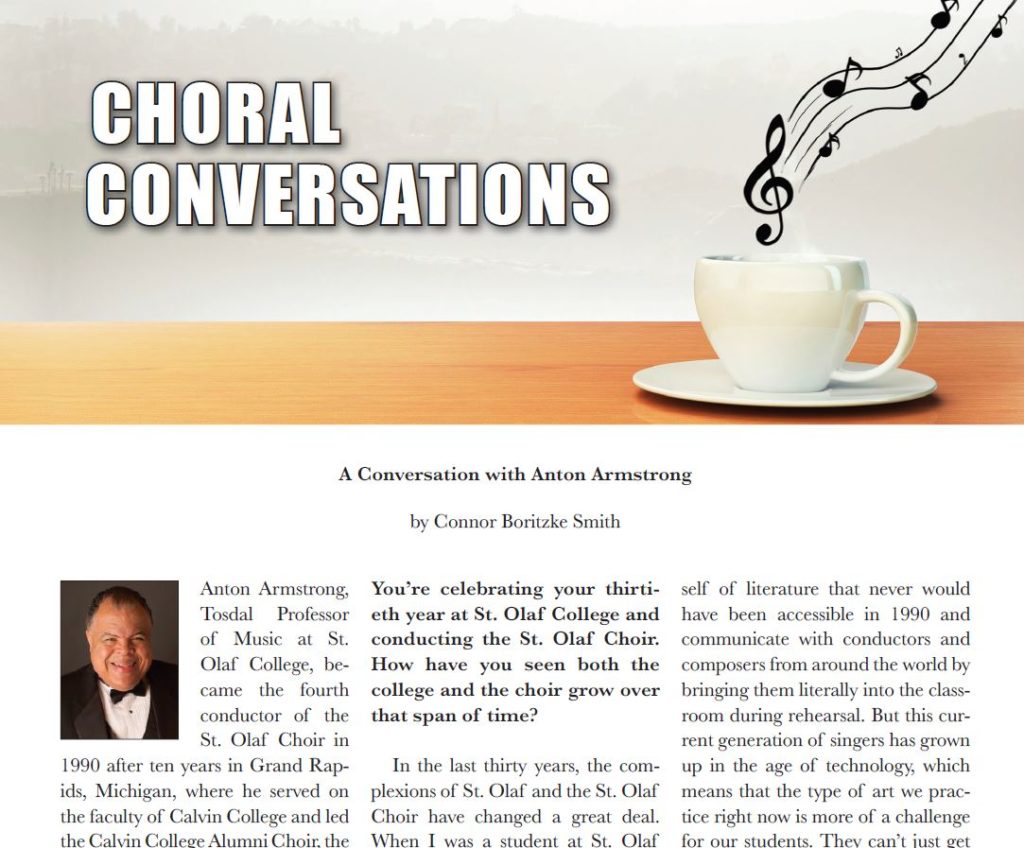
_____________________________
Choral Journal’s ongoing column called “Choral Conversations” features interviews with noted choral conductors and composers. An interview with Anton Armstrong is featured in the April 2020 issue.
You can read the interview in its entirety online at acda.org/choraljournal. Click “Search Archives” and choose April 2020 from the dropdown menu.
_____________________________
As someone who has traveled the world as a guest conductor and clinician, how have these international experiences shaped your view of choral music, and what are the most important things you’ve learned from these experiences?
I first traveled abroad as a member of the American Boychoir but didn’t travel again until I was invited to go back to my parents’ home region in the Caribbean and work for the Ministry of Culture and Education of the British Virgin Islands between 1985 and 1990. It was an incredibly validating and grounding experience to have my first international work be with people from my own roots and develop a deeper connection to the music I often heard as a child.
My international experiences have helped me learn that our work can help build bridges and heal wounds. The songs we sing from different parts of the world are often the way we enter a cultural experience very different from our own. If we can treat that music with respect and do our best to understand how and why that music originated, we start to understand the people who created it, and we find a commonality in how we exist together. Once we begin singing together, our differences of race, ethnicity, sexuality, and experience don’t disappear but instead cease to become barriers.
What do you find most challenging when preparing for the premiere of a new choral work?
Unlike preexisting compositions, there are likely no performance models to use as a study guide for premieres—whether it be an audio recording or performance video. Without that model, it’s squarely on your shoulders to find the interpretation of the piece that works best.
In my experience, I have learned that it’s essential to trust your own instincts—whether or not it perfectly aligns with what is written on the page. This can be quite a challenge, especially for young conductors and individuals working on their first premiere and learning to manage the conductor/composer relationship.
To address this challenge, I believe it is essential that conductors create honest and open communication with composers from the very beginning of the process, so that both can come to an understanding on the interpretations of a piece and forge a mutual path on how a score should be rendered. At minimum, my process includes a phone call with the composer. If I’m working with a local composer or we have the ability, I’ll invite them to St. Olaf to attend rehearsal so that we can delve further into the piece together and with our singers. The process isn’t always easy, especially if your vision isn’t congruent with the composer’s work. And occasionally, what a composer hears in their head may not be what works best for the piece when it’s actually brought to life.
_____________________________
Read the rest of this interview (and more!) in the April 2020 issue of Choral Journal.


Leave a Reply
You must be logged in to post a comment.